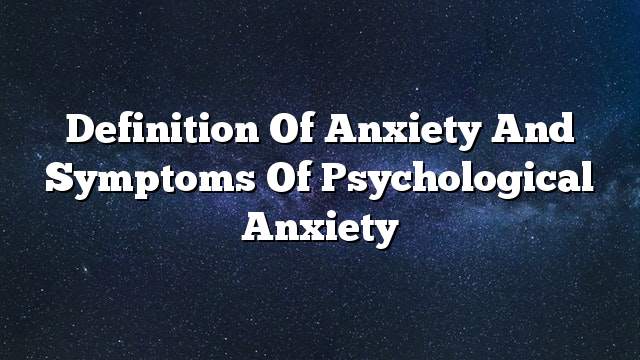Anxiety
Anxiety is a natural and useful function. It is a warning sign of a real danger so that a person can prepare to confront whatever may threaten his survival and existence. Anxiety is therefore necessary as a warning sign that he is being warned or cautioned, but becomes Problem if you exceed the normal limit.
Definition of anxiety
Anxiety is an unpleasant emotional experience experienced by an individual when he or she is afraid or threatened by something he can not precisely define. Anxiety is also known as a psychological state that appears to be continuously tense as a result of the individual’s feeling of danger. Imagination does not actually exist.
Patient characteristics are concerned
The feeling of fear is easily aroused by the anxious and they seem to be looking for things that cause them trouble, they are easy prey to disease and anxiety, and the characteristics of those who suffer from high anxiety:
- Dispersion and difficulty concentrating.
- Severe sweating or sweating of hands and rapid breathing.
- Problems with relationships with others.
- Sleep problems.
- Fatigue and fatigue.
- Weakness and inactivity.
- Gastrointestinal problems.
Causes of general anxiety and in particular children
- Lack of a sense of security: The lack of a sense of internal security is a major cause of concern; chronic anxiety is the result of insecurity and uncertainty about the self, and loss of the internal sense of security is the result of a combination of factors:
- Insecurity: The volatility of parents and teachers in dealing with the child leads to a state of confusion and anxiety in the child becomes life for him a series of frightening incidents that can not be predicted.
- Excessive perfection: Adult expectation of perfection results in responses to anxiety in many children, although some high achievers or obese children may avoid mature anxiety from not meeting adult expectations; others develop a state of disorientation and stress due to lack of Reach expectations.
- Neglect: The absence of clear boundaries and the neglect of children make them feel insecure as if they were abandoned.
- Criticism: Excessive cash leads to a state of turmoil and tension in the child; he feels self-doubt and is expected to be criticized, in which case any confrontation or self-disclosure can lead to a very anxious feeling, especially when the children know they will be assessed or Ruling in some way.
- Excessive trust by adults: The fact that adults trust children in their secrets is assumed to have adult aspirations and to burden children with such burdens prematurely generates anxiety.
- Guilt: Children may develop anxiety because they think they have behaved badly, and the problem is complicated when the child has a general feeling that he is not behaving properly and thus feels guilty because of his low effectiveness.
- Parenting Tradition: Concerned parents often have anxious children; children learn to worry, and see the danger in all that surrounds them.
- Persistent frustration: This leads to anxiety and anger.
- Harm or physical harm: Some people in certain situations are controlled by the idea of some diseases.
- Psychological preparedness (general psychological weakness).
- Stressful life situations: The cultural and cultural pressures resulting from the rapid changes in the era of globalization are causing psychological stress.
- Problems of childhood, adolescence and old age.
- The mismatch between real self, ideal self, and lack of self-realization.
- Models with others: Note the behavior of models and the consequences of these behaviors of punitive or reinforcement results affect the reality of individuals in learning and imitation of these behaviors or not, and parents in the early ages are models attractive to the building; where children learn from them many behavioral patterns, Values, trends, and emotions.
Levels of anxiety
The concern is divided into three main levels:
- Low levels of anxiety: There is a state of general alertness, vigilance and sensitivity to external events, increased ability to resist risks, and the individual is in a state of anticipation to face the danger of the environment where the concern here is a warning about the danger is about to get.
- Moderate levels of anxiety: Here is a state of inertia and non-automatic behavior, everything becomes a new threat, the ability to innovate decreases, and the individual makes an effort to conduct appropriate behavior to different life situations.
- Higher levels of anxiety: A breakdown of the individual’s behavioral regulation takes place and resort to more primitive methods, so that he does not behave in an appropriate manner or exaggerates his behavior and shows an imbalance.
The difference between objective anxiety and disease anxiety
The nature of the concern can be determined on the basis of its severity, causes, and continuity. The distinction between the objective (health) concern and the abnormal illness or neurological concern is as follows:
- Objective concern: It is a fundamental concern of external source, which is precisely a sense of fear caused by a real external factor and not from within the individual or the result of his ideas, which is required in the life of the individual, which is supposed to be acquired by the individual is usually a normal and balanced life, The life of the individual has become a sickly human being and is associated with human creativity.
